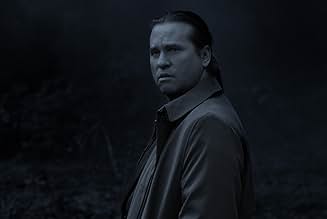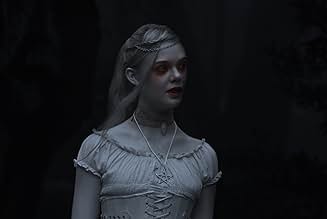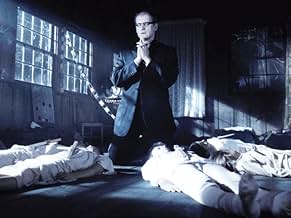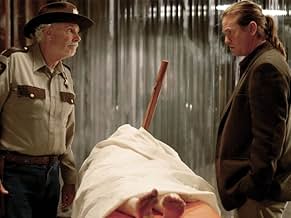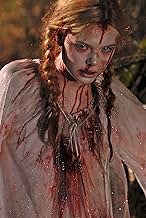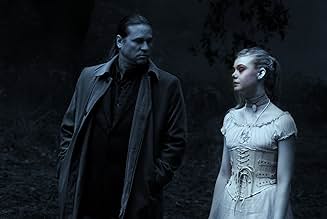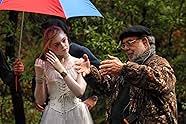एक छोटे से शहर में एक बुक टूर पर जाने वाले एक संघर्षरत डरावने लेखक को एक युवा लड़की की हत्या के रहस्य में पकड़ लिया जाता है. उस रात उसके सपने में, वी नाम का एक रहस्यमय युवा भूत आता है.एक छोटे से शहर में एक बुक टूर पर जाने वाले एक संघर्षरत डरावने लेखक को एक युवा लड़की की हत्या के रहस्य में पकड़ लिया जाता है. उस रात उसके सपने में, वी नाम का एक रहस्यमय युवा भूत आता है.एक छोटे से शहर में एक बुक टूर पर जाने वाले एक संघर्षरत डरावने लेखक को एक युवा लड़की की हत्या के रहस्य में पकड़ लिया जाता है. उस रात उसके सपने में, वी नाम का एक रहस्यमय युवा भूत आता है.
- पुरस्कार
- 2 कुल नामांकन
फ़ीचर्ड समीक्षाएं
However, one of the reviews informs us this story came to Coppola in a dream while he was in Turkey. He has a reputation for being a bit of a doper and this dream must have been enabled by an overdose.
The plot is an absolute mess and makes any sense in only about 3 or 4 scenes. I am not someone who requires all loose ends be neatly tied up, but this story goes nowhere.
I don't see any way to pay much attention and enjoy the film. Perhaps if you get bombed, don't think about the story and just enjoy the view, it could be worth your time.
Twixt is about the creative process. If you're put off by Coppola's more indulgent films, then you're simply not going to like this one, either. Early on, it becomes apparent that this is going to be a postmodern take on Gothic tales: the film opens with a hokey narration, the town is full of quirky stock characters, and the "real world" sequences play out like an interactive story. As the film progresses, these elements grow stronger, and a surreal element breaks down the barriers between reality, dreams, and fiction. This may leave some viewers exasperated or confused, as it's a far more experimental and indulgent story than something like, say, The Godfather or Bram Stoker's Dracula. What we see is a writer trying to deal with writer's block, guilt over his daughter's death, and how to make sense of the jumble of ideas that he's got in his head. Coppola seems uninterested in telling a straight-ahead Gothic story about a homicidal priest vs vampires, but I think this is the story that audiences wanted. They're unconcerned with the creative process, themes in Edgar Allan Poe's work, or metafiction.
There are many beautiful shots in the film that make use of digital effects. Val Kilmer wanders through his dreams in a black and white world that makes occasional use of striking, bold colors. The effect is similar to the semi-monochrome of Sin City, though it's used more sparingly. Unfortunately, as striking as the cinematography is, it doesn't really live up to the legendary expectations that many have come to expect from Coppola. Like Scorsese, he seems to have became a victim of his own early success, doomed to be forever judged harshly for anything that falls short of pure genius.
Val Kilmer is obviously looking a bit older, and, yes, he's gained some weight. Regardless, I found his performance to be pretty good. I was never a huge fan of Kilmer, but he's a likable guy, and he imbues this character with the same likable qualities. His performance is a bit muted and introspective, but there are occasional hammy moments, such as when he does some rather amusing impressions during a drunken scene of writer's block. Bruce Dern was really great, and I loved his character, a spunky and reactionary sheriff who served as the foil for Kilmer's character. Dern got to be as eccentric and lively as Kilmer was quiet and repressed, and it was fun to see them work off each other. The others were good, but Dern was just so much fun that I kept wishing he'd show up in every scene, do something crazy, and keep the film a bit more lively.
For fans of Edgar Allan Poe, Gothic horror, and literary analysis, this is a fun film. Others will probably be a bit disappointed. The pacing is significantly faster than Coppola's 70s work, but it's still a bit leisurely, and the lack of a coherent narrative may alienate people who just wanted to see vampires vs serial killers in a small town full of secrets.
Main failing is a complete lack of self-awareness, which often besets artists full of themselves. As indicated in the dreadful "Making of" short subject directed by his grand-daughter Gia, Francis is caught up in the craft of filmmaking, including dabbling with that ever-trendy (and pointless) gimmick 3-D, oblivious to the silliness of his script and the lousy scenes printed. Clearly living in the past of his successes, married with an ill-advised affinity for independent (and amateurish) modern filmmaking, he seems to lack the necessary self- criticism that helped him fashion classic work 40 years back.
Similarly, his lead Val Kilmer is also a has-been, content with underplaying most scenes and overacting crucial emotional ones, when not indulging in idiotic impressions (the Kevin Spacey syndrome), as when egged on by Coppola to "do Mark Twain". Apparently both star and director expect to earn brownie points for not caring one whit whether they make fools of themselves.
Early in the film I sensed a promising return to a type of fantasy and horror that once gave birth to the seminal classic "Lemora" starring Rainbeaux Smith, beloved by connoisseurs if not the general public. Its director Richard Blackburn was a one-hit wonder, or perhaps less since this was not a hit but more of a cult classic.
But to paraphrase Sen. Lloyd Bentsen, as applied not to Dan Quayle in the political arena, but to leading lady Elle Fanning, "You're no Rainbeaux Smith". A talented young actress, Fanning is a dead space on screen here in the crucial part of the mysterious undead girl who lures Val into the story. Besides soft porn roots, Coppola in the '80s was famously a hanger-on to the Adult industry, attending annual AVN awards dinners and hob-nobbing with sexy XXX starlets. Had he chosen porn rather than horror for this 2011 backsliding exercise, he could have cast the perfect young beauty Elsa Jean or even fulfilled by dream of giving current jail-bait superstar Piper Perri a chance to show her acting chops in Elle's role.
Storyline of has-been, bargain-basement Stephen King horror writer Val (character name: Hall) ordered by his publisher to come up with a "bulletproof" ending for his new novel, or else, it was sad to see how perfunctory and dissatisfying an ending triple-threat Coppola concocted for this movie. The tongue-in-cheek performances (especially by Bruce Dern as sheriff and transparent bad guy, another Corman graduate) and series of stupid scenes included a rather lame in-joke of Val's nasty and venal wife played by his real wife Joanne Whalley (ex hyphenate Kilmer in her stage name). I would have preferred Nastassja Kinski doing a snake dance. Similarly, the handling of the red-herring goth cult of youngsters dangled for us was pure cliché and even less believable than such filler as presented in '60s softcore movies.
The acid test for this junker is how it would have been greeted had it not borne the prestigious Coppola name in its credits. Perhaps critics and audiences would have felt sorry for an unknown filmmaker breaking in with a failed but technically adept genre piece. But for an all-time great wasting his time and intelligence on such crap -unforgivable.
Hopefully B'Twixt will open this classic to a wider audience, I'm sure there are a lot of people who would appreciate this film, and give it the recognition it deserves.
I love the dreamy flow of the story. I can't think of anything that resembles B'Twixt, it's funny and spooky. The camera work and editing makes it an ethereal journey from beginning to end.
क्या आपको पता है
- ट्रिवियाDirector Francis Ford Coppola had originally intended the film as a type of "live editing" experiment using groundbreaking digital editing technology. Coppola intended to act as a sort of conductor during every screening of the film, lengthening or shortening scenes and even changing plot elements depending on the audience response. This caused long delays in the film's release and ultimately proved impractical, forcing Coppola to do a locked edit of the film, integrating elements from all various permutations of the story.
- गूफ़When Hall Baltimore first goes to the hotel in the dream he orders just a beer. The beer is set in front of him and has a large head of foam. In the next scene the foam is gone. When the scene resumes the foam is back.
- भाव
[first lines]
Narrator: There was, once upon a time, a town not far from a big city. A road ran through, but there were only a few businesses. A coffee shop, a hardware store, a sheriff's office. And all kinds of people. Vagrants, run away teens, religious fanatics, retired seniors who, well, it was a town of those who wanted to be left alone. And so they were.
- कनेक्शनFeatured in Twixt: A Documentary (2013)
टॉप पसंद
- How long is Twixt?Alexa द्वारा संचालित
विवरण
- रिलीज़ की तारीख़
- कंट्री ऑफ़ ओरिजिन
- आधिकारिक साइट
- भाषा
- इस रूप में भी जाना जाता है
- Twixt Now and Sunrise
- फ़िल्माने की जगहें
- Aetna Springs, Pope Valley, कैलिफोर्निया, संयुक्त राज्य अमेरिका(Chickering hotel)
- उत्पादन कंपनी
- IMDbPro पर और कंपनी क्रेडिट देखें
बॉक्स ऑफ़िस
- बजट
- $70,00,000(अनुमानित)
- US और कनाडा में सकल
- $1,996
- US और कनाडा में पहले सप्ताह में कुल कमाई
- $1,996
- 2 अक्टू॰ 2022
- दुनिया भर में सकल
- $6,49,835
- चलने की अवधि1 घंटा 20 मिनट
- रंग
- पक्ष अनुपात
- 1.85 : 1
इस पेज में योगदान दें








